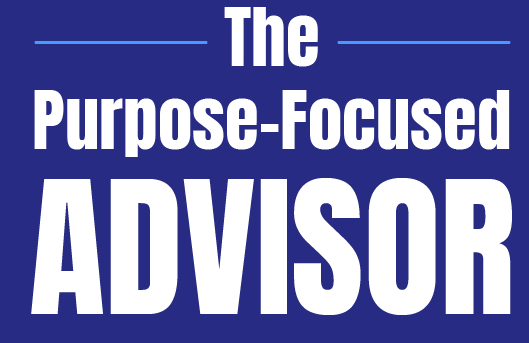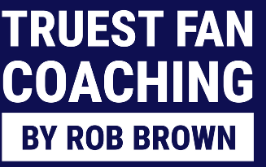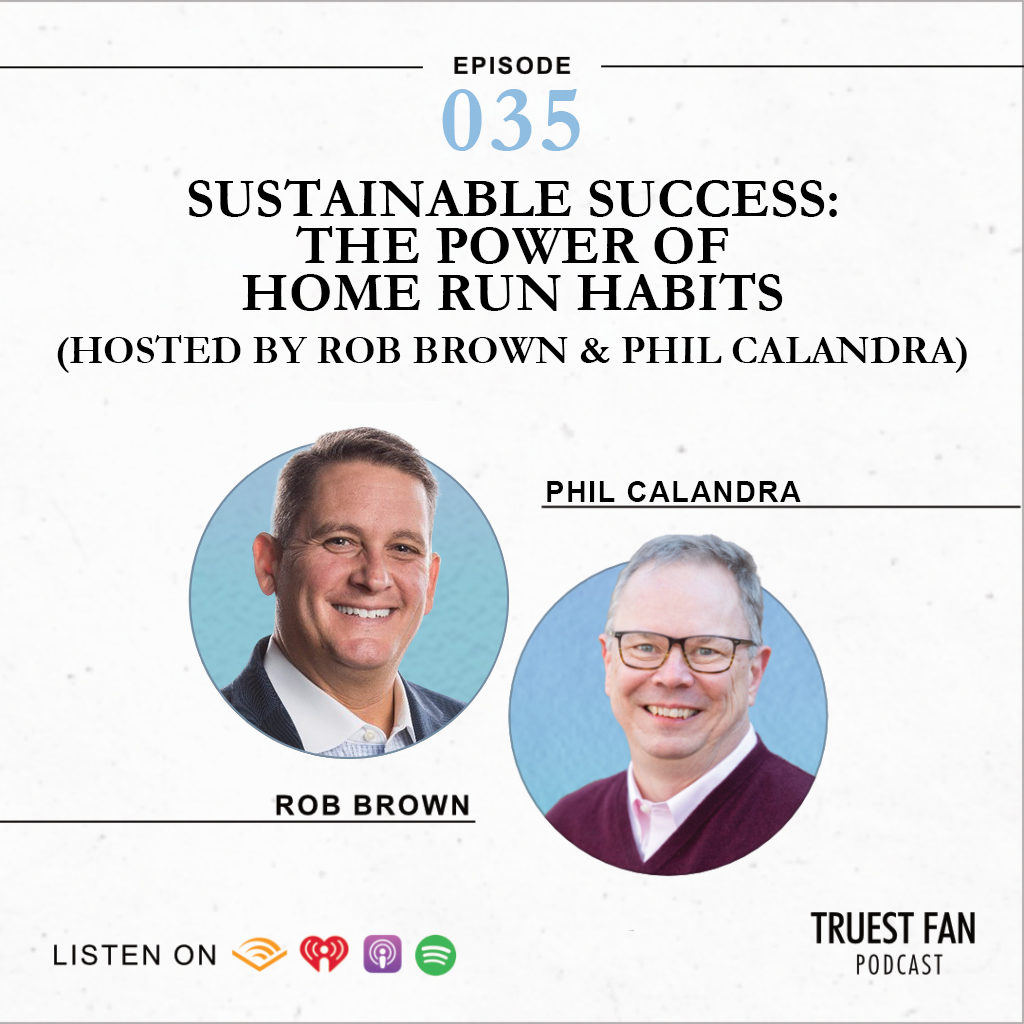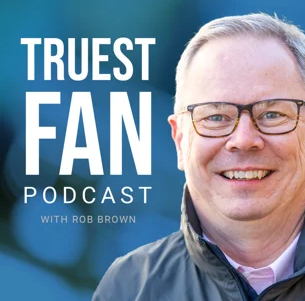Sustainable Success: The Power of Home Run Habits
Share:
In this episode of the Truest Fan podcast, we explore the power of habits. Sometimes, we think the word habits only refers to our bad habits, or that implementing good habits is too difficult. But, in reality, habits are a crucial part of the success process.
At Truest Fan, we have a term for success routines that we call “home run habits.” These are the habits that keep us on track towards our most important goals and help us turn our ideas into action. By implementing home run habits, we can reduce overload and make the journey towards success more enjoyable.
Listen as co-hosts Rob Brown and Phil Calandra share how simple and sustainable habits can make all the difference between achieving your goals and not achieving them. These habits can be the key to having fun with what you’re doing and moving at a faster, more exciting pace.
Start the 7-STEP “QUICK START” CHALLENGE
To listen, click the play button above. Or click the “Subscribe” button to go to your favorite podcast player.
Show Highlights
Resources
- Truest Fan Action Plan (TFAP)
- Truest Fan Action Plan (TFAP) Blueprint
- Truest Fan Episode 030: Dream Big to Achieve Your Most Cherished Goals
- Truest Fan Episode 031: Will You REALLY Accomplish Your Goals This Year?
- Truest Fan Episode 034: Sprinting to Success: Achieving Your Goals with Purpose
- The Founder
Important Links
Quotes
- "There is nobody out there exactly like you, operating exactly the way you do with the clients you choose to work with." -Rob Brown
- "If you can put the simple plan together and have the habits to reinforce the actions, things happen." -Rob Brown
- "A growth mindset is all about reinforcing good habits." -Phil Calandra
- "If you do something regularly, that can contribute towards the outcome or the desired result, you're going to get there much faster." -Phil Calandra
Podcast Transcript
Rob (00:05):
Sometimes I think the word habits gets a bad rap. Because we worry that we have too many bad habits. Or maybe we think that implementing new good habits is too difficult. But it’s part of the truest fan process. The blueprint, we have a term that we use called home run habits. And those are success routines that keep you on track for your most important goals and help you put your ideas into action. But they also reduce overload. And what you learn in today’s podcast, with myself, and my co host, Phil Calandra, is that these habits can be simple. They can be sustainable, and they can be the absolute difference between you achieving your goals, and not achieving your goals. The difference between having fun with what you’re doing, and having it be a drudgery, the thing that keeps you from going slow, and moving at a faster, more exciting pace. You’ll be glad you listen in.
You’re listening to the truest fan podcast. And now here’s your host, Rob Brown.
Rob (01:35):
All right, here we are, again, Rob Brown, founder of true is fan here along with my co host and partner, Phil Calandra. We’re here for another great episode of the truest fan podcast, we’ve been doing episodes together in this new format now for about four weeks. And it’s a lot of fun, Phil, I’ve really enjoyed this because, you know, this is, to me an example of us, dreaming big, putting some ideas together on how we could pursue something else that was really important to both of us together and then taking action. Because if these words sound familiar, you know, for the last few episodes, we’ve been talking about dreaming big, really accomplishing your goals, not just planning, but really accomplishing your goals. And to do that, to have an action plan. And last week, we introduced you to the truest fan action plan, as well as the truest fan blueprints. I just hold this up. For those who are watching, it’s our blueprint, it’s our path for helping our clients get from being scattered. That’s how we come across a lot of advisors, when they’re looking for somebody to help them chart their next phase of growth, and take them to a point of purpose and impact and more profits in their business. And today as we talk, we want to talk about some of the things that happen in a sprint or because of a sprint that you’re able to do personally and professionally. When your plans are based on actions and broken down into those smaller bite sized pieces. Phil, let me turn it over to you. I think you’ve got something really fun to share to get us started.
Phil (3:21):
Well, yeah, what we’ve been talking about is always pursuing your passion. And for a couple of episodes. Now if you’ve watched the video, you see this sign behind me. The mountains are calling and I must go. And a number of years ago, one of my passions was to spend four weeks in ski country, I love the mountains, I love snow skiing. I’m not particularly fond of cold weather that just comes along with it, you can layer up for that. So this year, I am going to have four weeks of ski vacations. And that was a dream, big idea. That was something that if you’d asked me four or five years ago, running my business, or I should say my business running me, I never would have been able to pursue or to fulfill, and it’s happening and I’m having the time my life. So it can happen if you follow a specific sequence, which is what we’ve been talking about having the Dream Big, setting the goals and then putting the action steps in place. And that’s what we coach people to do. And the results are that you’re going to maximize life. You know, I saw a recent quote, very recently, he was talking about how financial advisors which is what you and I do as a vocation, Rob, you know, we’re always focusing on the maximization of wealth. Well, what about the maximization of life and that’s the pursuit of a passion and that’s what makes this all worthwhile. So we want to focus today on action steps in the truest fan bloop. We call it home run habits. And if you show me somebody’s habits, I will tell you what their results and outcomes are going to look like. It doesn’t matter what you’re trying to pursue, if it’s in your business life, your family life, as a father or mother, if you have solid habits that contribute to movement, action towards your desired outcome, those are the people that are gonna get it. And it’s not just, you know, habits can be bad habits, we all have those habits can be good habits. And I think when I hear the word habits, I tie the word standard to it. So you want to have a habit, but you want to set it at a very high level, a high standard of performance. And if you think about those things, that’s what’s going to drive you and propel your action steps your action plan, what we call 12 week sprints, to fulfilment, and to the pursuit of the passion.
Rob (05:57):
Yeah, I was actually talking with a client earlier, I guess it was last week about this idea of home run habits, and he had just had a golf lesson, or a series of golf lessons with a really high level Pro and the golf pro said to him, you know, practice for in two hour time slots, at least three times a week, the first hour hit through your bag. So skipping out is basically every other club for an hour, but hit through your bag, and then a half an hour work on your short game. And for half an hour work on your putting. He says that set of habits will be the thing that will dictate your performance out on the course. And so that’s the kinds of things we talk about, we think about homerun habits, what are those things that you do repeatedly that will lead to that ultimate success? And I think sometimes some of the best examples are, I take from sports, because I’m a great observer of sports, not necessarily a great athletes, but that’s really important thing. But what are those things that you do? repeatedly? If you’re thinking about, you know, growing your business, I have some clients who have struggled with referrals? Well, we just built a referral habit that said, Out of the five client meetings that these advisors have, in a typical week, that they were going to make sure that they isolated to specific clients, that they would have elegant and professional referral conversations. And just that action, led to success and getting some additional referrals. In fact, now they’re having that conversation almost every time they’re in a client meeting. So just decided, hey, we’re going to, we’re going to go from zero and being sloppy about this, to making it a habit. They did it regularly. And they’ve and they’ve had the results that they want.
Phil (07:56):
Yeah, and I think you’re right, if you do something regularly, and you know, that can contribute towards the outcome or the desired result, you’re gonna get there much faster. We talked in the last episode a little bit about signature solution. That’s just a fancy word for blueprint or roadmap or diagram. And that’s one of the things that we believe we have Rob’s holding it up there. That’s nothing new. Rob, you didn’t create that, right? We didn’t create it. I think it was done at the Harvard Business School probably 100 years ago. But I use that in the same way. It’s the way that you can reinforce, in your own mind, your action steps, it’s the progression, it’s the things that you take clients through. And it could be the same thing personally, if you’re developing habits, it’s going to be I get in the habit of waking up at quarter to five, every morning, and I do the prescribed workout by my triathlon coach. Yes, I have a coach as well for triathlon, and I just have the habit of getting up and doing the workout, do enough of those things, then you’re gonna get to the pot of gold, you’re gonna get to the desired result. But that’s where most people fail is they don’t develop that habit, that mindset which we talk so much about, you know, a growth mindset is all about reinforcing good habits. If you’re in the habit of going to bed at midnight, that’s your habit, I doubt very seriously, you’re going to be able to nurture the habit of arising at 5am to go to the gym or lace up your shoes and go for your four mile run. So there’s a cause and effect of all the different habits. And I think that’s why I always bring it back to standard. My standard of performance is going to be this and I’m going to shoot for that every single day, whether it’s in the personal pursuit or in the business. So I think you’re right on Rob about the action steps.
Rob (09:53):
Yeah. And you know, in taking that action step, the habits idea, back to the signature salute Session actually reminds me of a client that I was working with last quarter. This was a client whose marketing was very scattered. An advisor who’s been around a long time, does a good job of serving his clients. But everything that he does was between his ears, it was just, you know, he knew from experience, the process, he wanted his clients, or future clients to walk through. But he had never taken the time to really create a way of showing somebody how he does what he does. And so it made it, he was good at closing. But it was harder than he thought, then he felt like he should just be able to, you know, close on the dime, like, open his mouth and say sign here. And that just wasn’t happening. So he said, you know, let’s talk about specifically, what you do first, like, what are your habits, when you’re taking your clients from where they come to you at point A? And where do you want them to be point B. So that was thinking about the habits, the routines of his client process, we broke that down, we created his version of a signature solution, so he could have something to show people. And then he committed that in every client and prospect meeting, for the course of the sprint, after which we had created a signature solution. He was going to go through it so that he could show people what his habits were for helping them. And he was like, Well, Rob, do I really want to do that with my clients. They know what I do, I don’t have to show them. And he showed them. And what happened is off. Now I get it. Now I understand the purpose behind these regular meetings and calls and things that we do together. And he got some great referrals because of it. Because now it was easier for his clients to make introductions to them. And then when he sat down with some prospective clients and started doing that, they say, wow, you know, my advisor doesn’t have a process like that. I liked that I liked the idea of understanding, you know, what’s behind the magic curtain that’s going on in those times that we aren’t talking. So he turned the habits that he has for helping his clients get from point A to point B, turning into a signature solution, and then turning that into a habit by using that signature solution. In meetings with clients and prospects, which have made all of those go better. And as you would imagine, he had a great quarter and has a lot of other really good stuff coming up. So that’s both a perfect example for why a signature solution is so important. But it’s also a great example of concentrating on a specific activity during a sprint to get it done to you know, not just decide, hey, I’m going to create my signature solution. I’m going to get it done and put it to work. And so that brings all the pieces together
Are you ready to discover your true purpose, live with impact and build an ever greater legacy? Than you need to make time for what truly matters most? Go to truest fan.com/challenge To begin the free, truest fan seven day Quickstart?
Rob (13:41):
Anything to add to that, Phil?
Phil (13:42):
Yeah, one thing that popped into my head, as you were saying that, and I I couldn’t agree more is, I think the biggest challenge or one of the biggest problems that I see with financial advisors, and those that I’ve coached is they really haven’t fully defined their own value proposition. And I know some of you are thinking, listening and hearing Oh, yeah, I’ve heard this before. And you’re right. It’s so beaten down that value proposition, the ideal client, it’s, we hear it so many times that all the meaning has been beaten out of it. And I think that people lose sight of kind of their philosophical view of the world, when it comes to in our vocation as financial advisors. So what do we end up doing? We end up going, as you said, scattered. We’re going from, you know, this market driven news event to, you know, to this tactical asset allocation model. We’re always like a gnat. We’re just buzzing around, as opposed to locking in on your best philosophical view and value proposition. And then using a tool, like a blueprint, like a roadmap, like a signature solution. I don’t care what you call it, but it grounds you in the action steps that You take clients through, and that makes all the difference. I do webinars just about monthly for my clients and prospects. And I have some of the same clients that come on to the webinars every single month. And at the end of the webinar, of course, what do I do? Rob, I open it up for q&a. And I have a couple handful of clients every webinar and they say, Phil, we didn’t learn a damn thing in this webinar. But you reinforced once again, what you want us to know what’s important. How do we think about this market? How do we think about our financial plan? Thanks for the information, hope you in the family are doing great. That is a successful webinar. Because I’m not trying to impart something new. I’m trying to reinforce the value proposition. For me. It’s behavioral management and financial planning. And that’s where the action can really drive results for the financial advisor.
Rob (15:56):
Yeah, that’s really true. And, you know, although I love advisors, for the most part, there are a few that may be driving me a little crazy. One of the things that is common, I think, in talking to advisors, especially those that haven’t really thought through this is, when you talk about an ideal client, they’ll say, Well, you know, there’s no ideal client, or you talk about your unique value proposition, I say, Well, currently, is there anything unique and they’re kind of falling into that? You know, me to idea that, you know, we all have access to the same stocks and funds and technology and planning tools, I’m gonna stop and say, No, I can promise you there is nobody out there, exactly like you operating exactly the way you do with the clients that you choose to work this. So that makes, by default, your value proposition unique. And it’s up to you to decide whether you want to make it the best unique it can be, or you just want to make it me too, and just act like everybody else, and not put your philosophies and your beliefs behind your process to work. And I think that’s really important. So I’m glad, I’m glad you highlighted that. Because that’s, I guess that’s a pet peeve of mine is, is the person that wants the silver bullet have this, you know, golden message that they’re going to deliver to everybody, but they’re not really willing to put in the time to figure it out, and then use it repeatedly. You know, the best businesses don’t change their core message, quarter to quarter, year to year, month to month, they do the same thing. Over and over again, they may find different ways to tell the story to different situations. But it’s the same process
Phil (17:48):
Yeah, you know, that reminds me of the movie about the founder of McDonald’s not the original founder but Ray Kroc called the founder that was the name of the movie, right? And what made McDonald’s so successful? When Ray Kroc came in, and reengaged the McDonald brothers process, every hamburger at McDonald’s is made the same exact way. And why does McDonald’s sell billions and billions of hamburgers, because people that go to McDonald’s, they want the hamburger and McDonald’s gives it to them the same way every time, although not very healthy or good for you. But when you go to McDonald’s, guess what, you know exactly what you’re gonna get. I love Marriott, I love to stay at a Marriott courtyard. Why? Because every time I walk into a Marriott courtyard, I know pretty much what I’m gonna get. And that’s reassuring to our clients, that’s reassuring that you’re not going to come up with some off the wall hedge fund crypto, tactical sector rotation model. And then when that fails, then you’re going to go to the next big idea, which is, you know, puts calls and, you know, options, strategies on the market, I don’t know making stuff up. Clients want to be reassured that they’re gonna get the same thing every time from their advisor. And those are action steps kind of bringing this back. Those are homerun habits. Those are things that we do inside of our businesses inside of our practice, that our clients can readily understand. They’re not some obscure over their head Montra financial markets, it’s it’s easy for them to understand. And it’s easy for them to repeat to others, which then makes the client happy, which makes the referral machine kind of spin and we’ll do future shows on referrals, because that’s nirvana for the financial advisor. But it begins with what we call homerun habits. It begins with this, this progression and sequence of thought, and I hope that you’re getting a lot out of these podcasts. Those of you that are tuning in, I hope you’re beginning to see a bigger picture of what this can do for your practice.
Rob (19:53):
Right. You know, and it’s the classic example of business doesn’t have To be hard, you can implement simple systems, I think that’s one of the real values of what we’re suggesting in this, this whole idea of using the truest fan, blueprint to get from scattered to, to living and leading with more purpose and impact and growing your business. It doesn’t make it easy, simple and easy are not synonymous terms. But if you can put the simple plan together and have the habits to reinforce the actions, things happen, I just see it over and over again. I was I was thinking about the years my clients had last year and 201. Everyone had a great year, many of them saw their businesses grow, despite the crazy market, some, you know, the markets hurt them a little bit more than others. But not one of my clients ended the year saying, you know, you know, 2022 got me and this was a lousy year, because they did the planning, they put the work in, they had to make some adjustments along the way as we sprinted through the year. But when it got to the end of year, I say, you know, it was a good year it was and that’s yeah, to me, that’s really important. They’ll say, Hey, I I’m having my best year right now, because I know I’m doing what I need to do.
Phil (21:23):
Yeah, no, I love that. I love the down years. Rob, I love the bear markets. bear markets are opportunities, the best advisors right now. We are stealing other advisors businesses right from under their noses, because they don’t have the right habit. They don’t have the right action and standards, they don’t have the right signature solution value proposition I could go on and on. I hope the market crashes another 20% Not from the standpoint of my portfolio. But I can sure take a lot of clients away from other advisors that aren’t nailing this down right
Rob (21:56):
now. I’m not sure I’m gonna wish that at all. Yeah, let’s not put that down and take that back in the universe then.
Rob (22:05):
Yeah, no, it’s true, though, because it also ties back to dreams, right? I just think it’s important to reinforce this whole progression of going from dreams, to real goals, to taking action, and everything. But when you go back to the dreams, when you have a year, like last year, like maybe we’re going to have again, this year where things are a little bit sloppy, you’re not too worried about it, because you’re still focused on what’s most important to you. And, you know, the the upsets that happen in the markets and in in the world, you know, may take you off kilter a little bit, but if they’re real dreams, and they’re backed by your goals and your actions, you know, it’s going to be okay, it’s easier to keep positive. Keep moving ahead, I got a message yesterday from a client who said, you know, I think I’m going to change my definition of what success means to me. And he goes, what I’ve learned from going through this process that we’ve been working on is that I want to intentionally be the best version of myself. That’s great. I intentionally be the best version of myself, best version of myself is kind of a can be overdone. And it was part of his previous monitor, but he added intentional to the front of it. And that’s that’s what we want to help folks do as we lead you through this blueprint and you listen to future shows. We want to help you intentionally be the best version of yourself in life and in business and all of the things that you you care about
Phil (23:49):
That’s right. And with that, I’m intentionally going to hit the slopes today. Yeah, I’ve
Rob (23:55):
kept you a little a little too long with Phil, thanks again for joining in. Thanks to the audience for listening to this podcast. I hope you’ve taken away some great ideas. And as always, we’re rooting for your success because we are your truest fans. Take care




